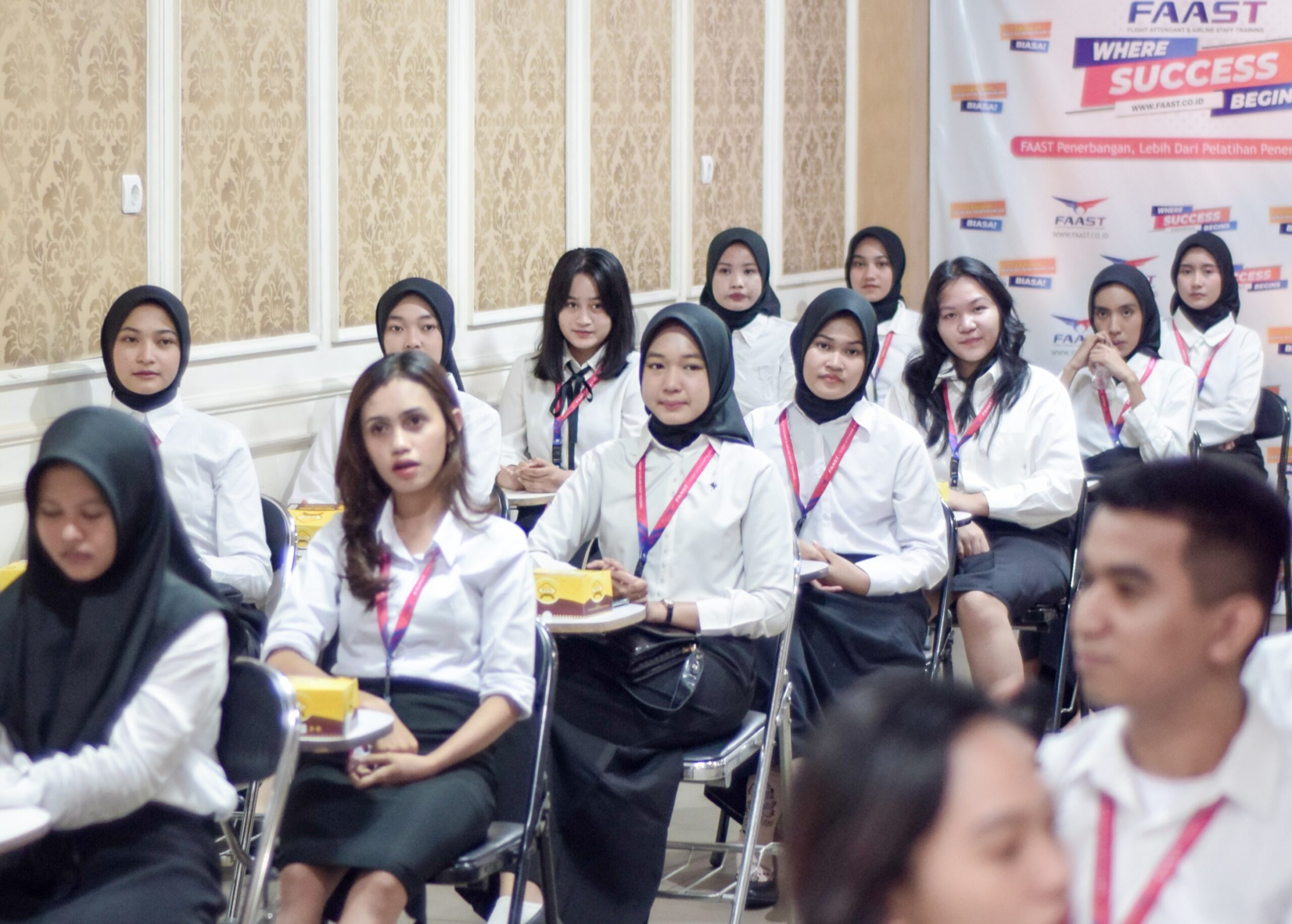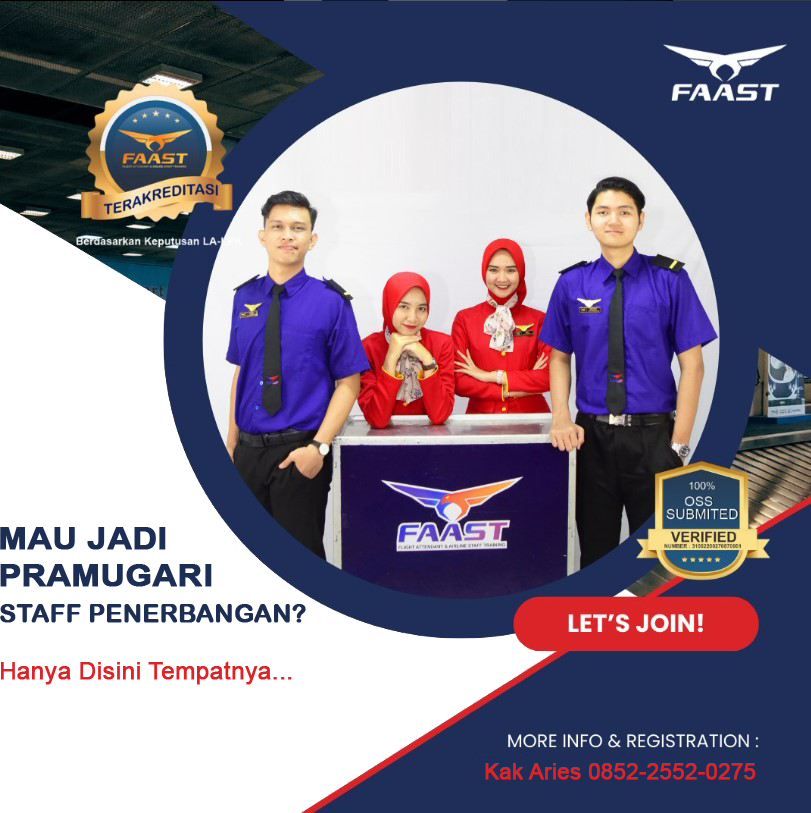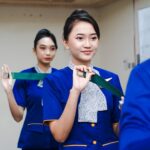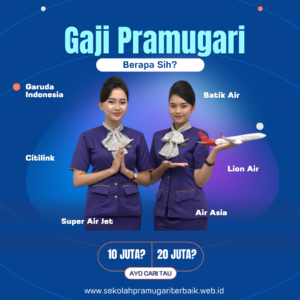The flight attendant test is a series of evaluations carried out by airlines to assess the suitability and skills of prospective flight attendants. This test aims to ensure that flight attendants have the necessary abilities to carry out their duties well and meet company standards. The following are several types of flight attendant tests that are commonly carried out:
- General Knowledge Test: This test covers various topics such as knowledge of airlines, aviation industry, aviation regulations, passenger service, and flight safety. Aspiring flight attendants are tested to ensure that they have an adequate understanding of their job and their work environment.
- Language Skills Test: Language skills are very important for flight attendants, especially because they often interact with passengers from various countries. Language tests may include speaking ability, listen, read, and write in the language required by the airline.
- Communication Skills Test: Flight attendants must have good communication skills to interact with passengers effectively. This test may include simulating interaction situations with passengers, where prospective flight attendants are tested on their ability to handle questions, request, or situations that require effective communication.
- Interpersonal Skills Test: Apart from communication skills, Flight attendants must also have strong interpersonal skills to interact with co-workers and passengers. This test may include an assessment of the prospective flight attendant's ability to work in a team, resolve conflicts, and provide friendly and professional service.
- Physical Health Test: Physical health tests are carried out to ensure that prospective flight attendants have adequate physical health to carry out their duties. This may include a medical examination, blood test, vision test, and hearing tests to ensure that flight attendants do not have medical conditions that could impair their performance.
- Safety Tests and First Aid: Flight attendants are responsible for the safety of passengers during the flight and must have adequate knowledge of safety procedures and first aid. This test includes a simulation of an emergency situation where prospective flight attendants are tested on their ability to handle emergency situations, provide first aid, and carry out emergency evacuations.
- Customer Service Skills Test: Customer service is an important part of a flight attendant's job, and this test aims to assess the prospective flight attendant's ability to provide friendly customer service, efficient, and professional. This may include simulated customer service situations where prospective flight attendants are tested on their ability to handle various situations and requests from passengers.
- Style and Appearance Test: A flight attendant's appearance is an important part of a company's image, and this test aims to ensure that prospective flight attendants meet the appearance standards set by the airline. This may include an assessment of physical appearance, grooming, and the dress style of prospective flight attendants.
- Flight Simulation Test: Flight simulation tests are designed to simulate the actual flight experience inside an aircraft cabin. Aspiring flight attendants are tested on their ability to perform tasks such as security announcements, food and drink service, and handling emergency situations.
- Psychological Testing: Psychological tests are carried out to assess personality, motivation, and the mental readiness of prospective flight attendants to face challenges related to their work. This may include a personality test, career interest test, and psychological interviews to identify the personal characteristics and qualities necessary to be a successful flight attendant.
In the flight attendant recruitment process, Airlines may use a variety of these tests or a combination of several tests to assess the qualifications and potential of prospective flight attendants. Each test plays an important role in assessing a flight attendant's ability and suitability, thereby ensuring that they meet the standards set by the airline.
Read Also : Official Association of Flight Attendant Schools

Tips for Successfully Passing the Flight Attendant Test
Successfully passing the flight attendant test requires thorough preparation and a positive attitude. Here are some tips that can help you:
- Get to Know the Requirements: Make sure you understand the requirements set by the airline you are applying to. This includes educational requirements, Skills, and physical attributes required.
- Learn About Airlines: Do some research about the airline you are applying to. Learn as much as you can about history, values, flight route, and company brand image.
- Update Resume and Cover Letter: Make sure your resume and cover letter reflect your skills, experience, and your interest in the aviation industry. Highlight any experience or skills relevant to the flight attendant job.
- Prepare for the Interview: Train yourself to face the interview with confidence. Prepare answers to common questions such as why you want to become a flight attendant, your strengths and weaknesses, and how you handle difficult situations.
- Pay Attention to Appearance: Your physical appearance is very important in the aviation industry. Make sure you have a neat and professional appearance when attending the test, including good grooming and appropriate clothing.
- Develop Language Skills: If you are applying for an international airline, Good language skills are a valuable asset. Improve your language skills, especially foreign languages commonly used in the aviation industry.
- Sharpen Communication Skills: Flight attendants must have good communication skills. Practice this skill by practicing speaking confidently, listen well, and interact with other people.
- Learn Safety Procedures: Learn flight safety procedures and first aid. You may be tested on your knowledge of safety procedures during the test.
- Maintain Physical and Mental Health: Make sure you are in good physical and mental condition when attending the test. Enough rest, eat healthy food, and manage stress well.
- Be Positive and Confident: Be positive and confident during the test. Show recruiters that you are motivated, commitment, and the skills needed to be a successful flight attendant.
- Practice Test Simulation: Train yourself by doing a flight attendant test simulation. Practice interviewing, simulation of emergency situations, and other tests to familiarize yourself with the test format and demands.
- Receive Feedback: If you don't pass the first test, ask for feedback from recruiters or other participants. Use this feedback to improve your performance in the future.
By preparing yourself well and having a positive attitude, You can increase your chances of passing the flight attendant test and achieve your dream of working in the aviation industry.





























Leave a Reply